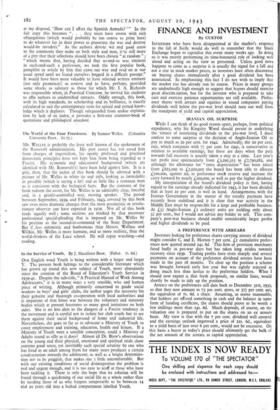FINANCE AND INVESTMENT
By CUSTOS
INVESTORS who have been disappointed at the market's response to the fall of Sicily would do well to remember that the Stock Exchange began to capitalise this event many weeks ago. In doing so it was merely performing its time-honoured role of looking well ahead and acting on the view so presented. Unless good news happens to come as a surprise it is usually the signal for a fall and not a rise in stock market prices, as investors have often discovered on buying shares immediately after a good dividend has been announced. In emphasising this fact I do not wish to imply that the market rise has already run its course. Prices in many groups are undoubtedly high enough to suggest that buyers should exercise great discrimination, but for the investor who is prepared to take care and exercise patience opportunities are still available. Piefer- ence shares with arrears and equities in sound companies paying dividends well below the pre-war level should turn out well from the standpoint of yield and capital appreciation.. INVESTORS who have been disappointed at the market's response to the fall of Sicily would do well to remember that the Stock Exchange began to capitalise this event many weeks ago. In doing so it was merely performing its time-honoured role of looking well ahead and acting on the view so presented. Unless good news happens to come as a surprise it is usually the signal for a fall and not a rise in stock market prices, as investors have often discovered on buying shares immediately after a good dividend has been announced. In emphasising this fact I do not wish to imply that the market rise has already run its course. Prices in many groups are undoubtedly high enough to suggest that buyers should exercise great discrimination, but for the investor who is prepared to take care and exercise patience opportunities are still available. Piefer- ence shares with arrears and equities in sound companies paying dividends well below the pre-war level should turn out well from the standpoint of yield and capital appreciation..
IRANIAN OIL SURPRISE
While I can think of. no good reason apart, perhaps, from political expediency, why Sir Kingsley Wood should persist in underlying the virtues of restricting dividends to the pre-war level, I must confess to some surprise at the decision of Anglo-Iranian Oil to pay as much as zo per cent. for 1942. Admittedly, the 20 per cent. rate, which compares with 71 per cent. for 1941, is conservative in relation to available earnings, but these are days when the path towards full recovery is usually taken a step at a time. Last year's net profit rose spectacularly from £3,292,315 to £7,790,282, and although the allowance for " extra depreciation " has been raised from £625,0oo to £2,000,000 the board has been able to allocate £500,000, against nil, to preference stock reserve and increase the carry forward by nearly £200,000, as well as pay the higher dividend.
My interpretation of the board's dividend policy is that, having regard to the earnings already indicated for 1943, it has been decided that at least zo per cent. is well in hand. Arrangements, with the Iranian Government in the matter of the royalty payment have recently been stabilised and it is clear that war activity in the Middle East must be responsible for a large and profitable business. At £51 Anglo-Iranian £r ordinary units are yielding only about 3+ per cent., but I would not advise any holder to sell. This com- pany's post-war business should enable considerably larger profits and higher dividends to be paid.
A PREFERENCE WITH ARREARS Investors looking for preference shares carrying arrears of dividend might consider C. and E. Morton 7 per cent. £r cumulative prefer- ences now quoted around 24s, 6d. This firm of provision merchants fared badly in pre-war days but has taken long strides towards recovery since 1939. Trading profits have risen sharply and several payments on account of the preference dividend arrears have been made in the past 18 months. To dear up the position a scheme was brought forward early last year but was rightly rejected as doing much less than justice to the preference holders. What I should now expect is that fresh proposals, on similar lines, would shortly be made to tidy up the position.
Arrears on the preferences still date back to December 31st, 1932,
so that they now amount to 75 per cent. gross, or 37+ per cent. net, the equivalent of 7s. 6d. a share. Assuming, as seems reasonable, that holders are offered something ip cash and the balance in some form of funding certificate, the shares should prove to be worth a few shillings more than z4s. 6d. Much depends, of course, on the valuation one is prepared to put on the shares on an ex arrears basis. My view is that with the 7 per cent. dividend well covered and the earnings outlook improved a price of 22S. 6d,, equivalent to a yield basis of just over 6 per cent., would not be excessive. On this basis a buyer at today's price should ultimately get the bulk of the net amount of the arrears as capital appreciation.


























 Previous page
Previous page